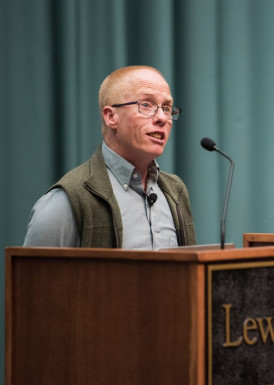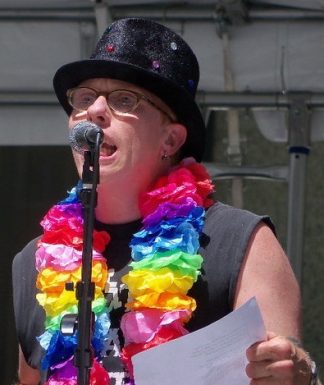Lectures & Keynotes


Eli is a sought-after speaker. Below are some of the speeches he has given.
- He can present any of the following as stand-alone lectures or interactive talks.
- Suitable for conferences, classrooms, or public presentations.
- Can be tailored to a general audience or to a specific group with more advanced knowledge of disability, LGBT issues, and/or social justice from an intersectional perspective.
- Designed to range from 30 to 90 minutes.


Speeches (read excerpts):
Moving Close to the Ground: A Messy Love Song
(first given as a talk at the Queer/Trans Ecologies Symposium, University of Minnesota, 2023 )
“In disability community, we rarely talk about sliding, scooting, crawling, crab walking. We appreciate the speed of power chair users on smooth firm ground, admire the broad shoulders of manual chair users. We trade mobility techniques, talk mechanics, support each other through the bureaucracy of acquiring new gear. We relish gimpy ways of walking: the rhythm and sounds of forearm crutch users, the pure loveliness of how we decorate our canes and accessorize with them. In contrast, we seem loathe to talk about, much less admire, modes of mobility that bring us close to the ground.
“When we’ve been forced to drag ourselves up or down a flight of stairs—either in public because of outlandish inaccessibility or in private because we simply want to be with friends—we will tell stories about feeling humiliated, embarrassed, or enraged. But we don’t exchange tips about sliding, when and where we scoot, how we protect our hands and wrists while crab walking. We’ve not shared and accumulated decades of community know-how about crawling. Those of us who move close to the ground for pleasure or utility do so mostly in isolation.
‘….when I face a craggy trail, a lip of rock, or a narrow bridge without handrails—my balance more precarious than usual—I often drop down onto my hands and knees. Neither a protest against ableism nor a performance of disability, moving close to the ground offers me so much possibility and connection. Muscles loosen. Pace slows. Eyes, ears, nose focus. Yet I am still alone.”
Medical Technology, Disposability, and Profit: Thinking Beyond and Around Covid-19
(first given as a talk at Syracuse University, 2021 )
“Collectively in the white Western world, we go to such lengths to un-choose disability. We wear seat belts. We don’t dive into shallow water. We vaccinate against polio and measles. Certainly these actions are about avoiding death, but our avoidance quickly mashes into the un- choosing of disability. Consider for instance public service announcements and advertisements that warn against unsafe and drunk driving…. We un-choose disability in hundreds of ways. We condone genetic testing for pregnant people and rarely question the ethics of disability- selective abortion. Some pro-choice activists justify late-term abortions with talk about fetal abnormalities—or in plainer language, disability. We accept as a matter of course that sperm banks screen out donors with a whole host of body-mind conditions considered undesirable. We walk to end breast cancer and run to end diabetes. We want to control how, when, and if disability and death appear in our lives.”
Queer Disabled Legacies: Reading Laura Hershey’s Poems
(first given as a talk at the University at Buffalo, 2021 )
“Questions about pride, queerness, and disability access hover as I read poems of white, disabled, lesbian poet Laura Hershey. I remember a conversation she and I once had about LGBTQ community. She was clear that she had found no home or resting place there. She wrote in a world shaped by the absence of ramps and elevators, which meant that all too often she couldn’t access the bars, bookstores, and many other public spaces where queer and trans communities are built. She wrote in a world shaped by endless ableist stereotypes, which meant that far too many non- disabled LGBTQ people treated her as undesirable and child-like. She named the daily grind of ableism that she encountered everywhere—and felt keenly in queer community—’the violence of stairs.’ I pause to absorb the gravity of the word violence and the pun on the word stairs, referring both to an architectural feature that completely privileges walking over rolling and to the act of gawking.”
Defective, Deficient & Burdensome: Thinking about Bad Bodies
(first given as a talk at the Clifford Symposium, Middlebury College, 2015 )
“….Across the centuries, how many communities have been declared inherently defective by white people, rich people, non-disabled people, men backed by medical, scientific, academic, and state authority? I ask this question rather than answer it, because any list I create will be incomplete. I think of white women suffragettes fighting for the right to vote, declared defective as a way of undercutting their demands; Black people kidnapped from west Africa and enslaved in the Americas, declared defective as a way to justify and strengthen slavery; immigrants at Ellis Island declared defective and refused entry to the US; lesbians and gay men declared defective and given hormones to cure their homosexuality. The list of peoples considered defective keeps growing, the damage deepening.
“Defectiveness holds such power because ableism builds and maintains the very notion that defective body-minds are bad, undesirable, disposable. In a world without ableism, defective as it is applied to humans, meaning the ‘imperfection of a bodily system,’ would probably not even exist. But if it did, it would only be a neutral descriptor. However, in today’s world where ableism fundamentally shapes white Western cultural beliefs about normal and abnormal, worthy and unworthy, whole and broken body-minds; any person or community named defective can be targeted without question or hesitation for eradication, imprisonment, institutionalization. The ableist invention of defectiveness unequivocally names many body-minds bad….”
Longer excerpt and video – Defective, Deficient & Burdensome
Notes on Cure, Disability & Natural Worlds
(first delivered as a talk at San Diego State University, 2013 )
“As an ideology seeped into every corner of Western thought and culture, cure rides on the back of normal and natural. Insidious and pervasive, it impacts many, many bodies and minds. We need to respond not with a simple or reactive belief system, not with an anti-cure stance in the face of the endless assumptions about body-mind difference, but rather with a broad-based politics of cure mirroring the complexity of all our body-minds. The American Heritage Dictionary defines cure as the ‘restoration of health.’ Springboarding from this definition into a politics of cure, it would be all too easy to get mired in an argument about health, trying to determine who’s healthy and who’s not, as if there’s one objective standard. Instead I want to follow the word restoration. To restore a damaged prairie ecosystem is to return it to an earlier, and often better, state of being….”
Longer excerpt and video – Notes on Cure, Disability, and Natural Worlds
Hate Violence, Fierce Love: Histories of Grief, Rage & Resistance
(delivered as a plenary speech at the Shepard Symposium on Social Justice, University of Wyoming, 2009 )
“In this room today many of us carry histories of hate violence in our bodies; carry grief, outrage, fear, numbness, disbelief, despair, resistance, a desire for change. As we talk and think together in the next day and a half about hate violence, social justice, and the legacy of Matt Shepard, let us remember that the aftershocks and reverberations of hate and loss have a long half-life. Yes, the topics of this symposium are deeply political, but they are also profoundly tender. We need to be gentle and fierce, hold personal loss as well as social change strategies, make space for fear and grief as well as impassioned politics. We need to remember that some of us live with daily lack of safety, that there is nothing theoretical about the conversations we’re going to be having here. In short the intense histories that accompany hate violence are alive here and now, and not just as stories and events of the past. But before we turn to the harshness and heart break of hate violence, let me begin by invoking hope, because without hope, it’s so easy just to be overwhelmed and despairing….”
Resisting Shame, Making Our Bodies Home
(adapted from a keynote at the Trans Health Conference, 2008, and the Gender Odyssey Conference, 2008 )
“I come to this gathering thinking about shame—that chasm of loathing lodged in our bodies, a seemingly impenetrable fog, an unspeakable and unspoken fist. Shame all too often becomes our home. This is what I want to talk about, even though it’s one of those topics that makes us restless, uncomfortable, off balance. I could start with the politics of where shame comes from, how violence and media images, stereotypes and lies, weave together to become shame’s fertile ground. I could start with what we tell ourselves about pride, how we pair shame and pride as opposites and act as if there’s a distinct passage between the two. I could start with the ways in which trans communities talk around the edges of shame, using the language of body dissonance and gender dysphoria. But this afternoon I want to strike at the center, to talk directly about the raw, overwhelming mess that shame is….”
Trans Communities & Lessons from Disability Activism
(first delivered as a keynote at the FORGE Forward Conference, 2007 )
“Tonight I want to span the distance between disability politics and trans experience. Of course I could start with the substantial presence of disabled folks in trans communities, and by disability I mean cognitive, learning, sensory, and psych disability, as well as physical ones. Or start with the truisms about bringing experiences of multiple oppressions and identities to our work. Or start with the overdue need for accessible spaces, the importance of integrating ableism into our understanding of oppression. But really I want to delve beyond the rhetoric we often don’t pay attention to and think hard about three lessons I’ve learned from the disability activism. The first is about naming; the second, about coming out and disclosure; the third, about living in our familiar, ordinary bodies….”
An End to Ableism in Higher Education
(first delivered as a keynote at the annual gathering of the Association of Higher Education and Disability, 2004 )
“….Let me start with a story. 1969 in the backwoods of Oregon, I started the ‘regular’ first grade after a long struggle between my parents and school officials who wanted me in the ‘special education’ room. When I was two, my parents had taken me to a state-run hospital where a seemingly endless number of doctors, physical therapists, speech pathologists, psychologists, and who-knows-who-else put me through a battery of tests, designed, I suppose, to figure out what was ‘wrong’ with me. I didn’t yet talk and so was given an IQ test that relied not on verbal skills but on fine motor coordination. And I, being a spastic little kid with cerebral palsy, failed the test miserably. I simply couldn’t manipulate their blocks, draw their pictures, or put their puzzles together. In the end they diagnosed me as ‘mentally retarded’….”
Digging Deep: Thinking about Privilege
(first delivered as a keynote at the Against Patriarchy Conference, 2003 )
“….How do we make the space to talk honestly and wrenchingly about all the multi-layered systems of injustice that target some of us and privilege others for who we are? The layers are so tangled: gender folds into disability, disability wraps around class, class strains against race, race snarls into sexuality, sexuality hangs onto gender, all of it finally piling into our bodies. I dare say everyone in this room has stories of both oppression and privilege. How do we dig down to find, not uncrackable, unmovable rhetoric, but the concrete daily material, emotional, and spiritual realities of privilege and oppression on this planet rife with injustice….”
